In case you didn’t already know, Microbiologists are people who study the world of organisms that are too small to be seen with the naked eye i.e. viruses, bacteria, fungi and algae. They study the structure, form, behavior, growth and distribution of these organisms. In this edition of Growing Up Magazine, we interviewed Dr. Ugochi Ohajuruka, who studied microbiology and used the knowledge gained to invent sustainable sanitary kits for teenage girls, thereby controlling the spread of diseases. Enjoy!
 Tell us about being a Microbiologist?
Tell us about being a Microbiologist?
My first degree was in Microbiology at the University of Ibadan. We learnt about microorganisms, the harmful microbes and the beneficial microbes. We also learnt about plants and their medicinal properties. I enjoyed the course work but deep within me, I knew I wanted to add more to my knowledge of microbiology. So immediately I graduated from the University of Ibadan and finished my youth service, I went straight back to school and enrolled to study Medicine and Surgery. Then I proceeded to the UK to specialize in Public health after working briefly at the National Hospital Abuja.
What are the qualifications/skills/qualities that one needs for a career in Microbiology?
To qualify as a microbiologist, First you have to pass the science courses and also have the passion for the course. It requires a lot of practical which usually takes place in the laboratory. You peep into the microscope for long hours, you also need a good memory because you have to memorize generic names of several microorganisms and botanical names of plants as well. It is as challenging as it is interesting!
Tell us about Days for Girls International
Days for Girls International (DfG) is a US-based 501c (3) nonprofit organization working in 86 nations in 6 continents. Days for Girls Nigeria works in partnership with Health Aid For All Initiative (HAFAI), a registered Nigerian NGO. They focus on menstrual hygiene management by helping girls and women gain access to quality sustainable sanitary kits, create awareness on reproductive health education and importantly, by helping ultra-poor communities start their own programs by training them to make kits to sell them and earn an income from it to tackle poverty. We do this by collaborating with like-minded nonprofits, groups, organizations and high commissions because we believe that every girl in the world deserves education, safety, and dignity.
And the Days for Girls Kit?
Because we realized that going without basic sanitation threatens a girl’s education, health, safety, family, future and her dignity, we created affordable, easy to maintain sustainable sanitary kits. The kit is simple and yet effective
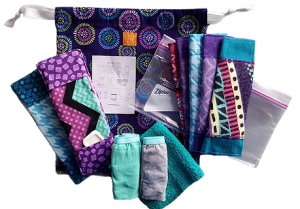 The hygiene kits are unique, washable, comfortable and environmentally friendly. The kit:
The hygiene kits are unique, washable, comfortable and environmentally friendly. The kit:
- Washes with little water/dries quickly
- Adjusts to personal flow
- Convenient and dependable
- Cost effective savings
- Works with any pants
- Use regular toilet soap to wash
- Colourful and produced locally
- Last up to 3 years
Can we say that your knowledge in microbiology was what helped in the creation of these kits for young people?
I would say that my background as a microbiologist and also a medical doctor has better prepared me to understand the issues surrounding feminine hygiene management and its implications on the health of women and girls. Poor menstrual hygiene management can lead to infections and possibly infertility in the future. Our observation from the field shows that girls use all kinds of unhygienic substance for their menstrual hygiene management, the stigma and taboo around it also affects the dignity and self-esteem of the girl. Studies have shown that Lack of access to sustainable menstrual hygiene solutions leads to girls missing days out of school and this was what inspired our creative innovation of producing a menstrual kits called Days for Girls kit made from local fabrics and last for three years replacing up to 36 boxes of disposal sanitary pads and addressing gender inequality.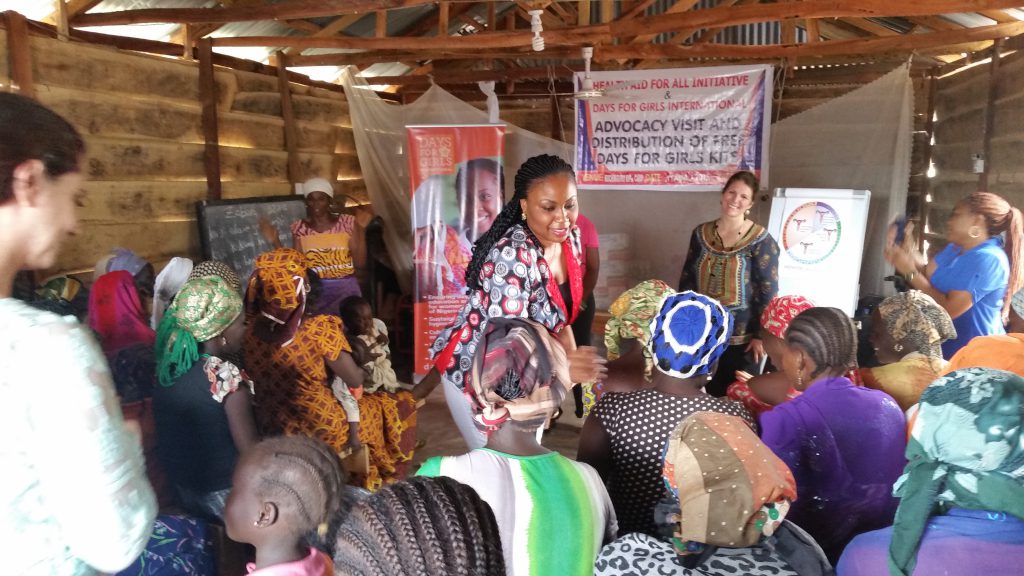
Can you give us a picture of how your regular day is like?
My day starts at 5 am; I wake up, do my morning devotion and get my laptop, view my emails and respond appropriately. Thereafter, I prepare my kids for school and make my husband’s breakfast, after which I proceed to the office at 8 am. I set up my day work plan even though I sometimes alter it as exigencies occur. While at work I attend to meetings, review the days’ work with the staff, read reports and distribute task to the staff for the day. When the need arises, I undertake engagements with ministries, development agencies, embassies and development partners and also try to factor in the school needs of my kids by ensuring that I pick them from school and also visit their teachers when necessary. Because the work I do has to do with women and girls, I spend a lot of time addressing issues around it by visiting communities, health centres, hospitals and schools, talking about issues such as reproductive health care, maternal and child health, gender inequality, rape, sexual harassment, HIV/AIDS, Human rights and creating opportunities to enhance opportunities for girls and women particularly in rural areas to improve their standard of living.
What do you find challenging about your work?
What I find challenging is that people are not giving back enough to the society, the needs of girls and women is enormous but the level of support from institutions and individuals is very low, I find this very frustrating. I expect people to give more back to the society, which has done so much for them. More so, my work entails going into the hinterlands and most time the roads are in deplorable conditions, most of our health centers also lack basic first aid therapies. Sometimes when we encounter sick people in the rural communities and refer them to local health centers, they are found not to be properly equipped as they are mere empty rooms without qualified doctors and nurses.
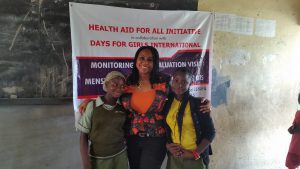 What do you find exciting about your work?
What do you find exciting about your work?
When people smile and come to say thank you for touching my life, it makes a lot of difference for me…I find joy when women and girls find their dignity and respect and are seen as equal partners in the society and when their rights are protected. Most importantly when girls confide in me and talk to me about their problems and I proceed to solve these problems and they say “Dr Ugo, I will like to be like you”… I feel fulfilled knowing that I am mentoring the next generation of women.
What is your greatest perk about working in this field?
The perk for me is having the opportunity of meeting with like-minded people, organizations and individuals, attending conferences both local and international, meeting people, including heads of Governments that make policies that positively influence the lives of women and girls around the world.
What is your advice to young people on generating income for themselves to make ends meet?
My advice to young people is that they should remain focused and be dedicated to their studies by working tirelessly and conscientiously towards achieving their goals. Getting proper basic education is important. Also identify a particular passion and skill and be very good at it, you will always be discovered and patronized.
Final words for young people?
My advice to young people is that they should avoid distractions, learn to say no to negative vices, stay focused and live your dream.
To learn more about Days for Girls International visit https://www.daysforgirls.org/

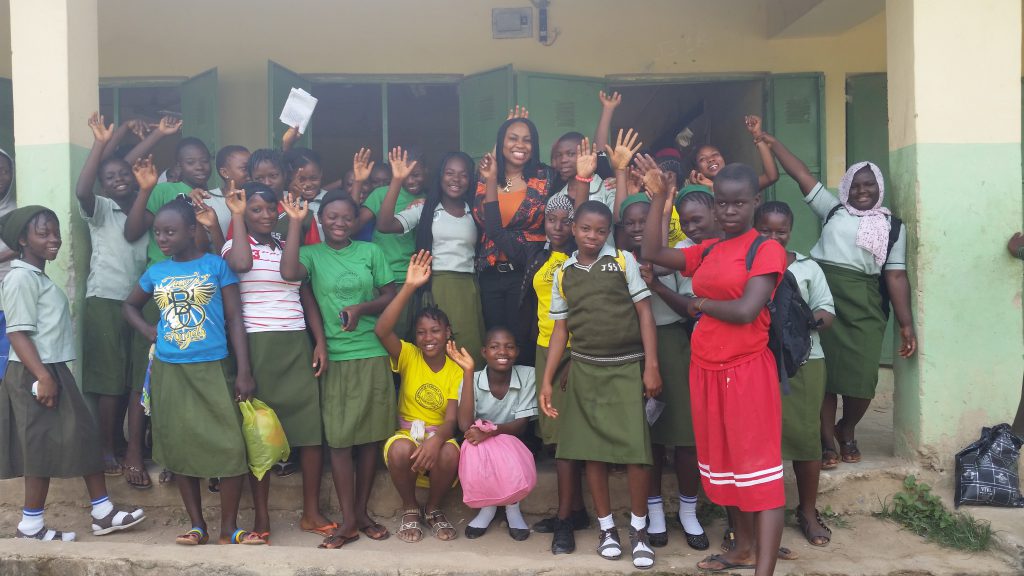
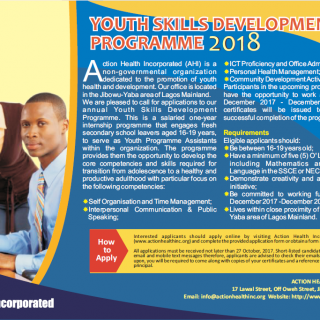


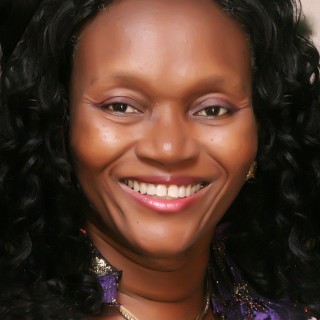
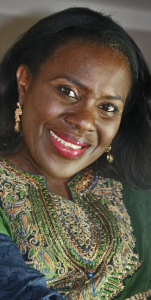

You must be logged in to post a comment.